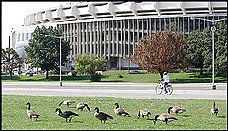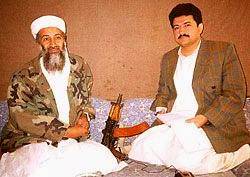(All emphases by Always On Watch)
In January of 2006, I composed a
blog article largely based on the
Washington Post article "
Reunified Islam: Unlikely but Not Entirely Radical: Restoration of Caliphate, Attacked by Bush, Resonates With Mainstream Muslims." According to that
Washington Post article:
"[T]he caliphate is also esteemed by many ordinary Muslims....Muslims regard themselves as members of the umma, or community of believers, that forms the heart of Islam. And as earthly head of that community, the caliph is cherished both as memory and ideal, interviews indicate."
Recently, discussion of the caliphate has resumed, in part because President Bush has been using the term in several of his speeches.
On October 23, 2006, Dr. Walid Phares wrote an essay entitled
"The Caliph-Strophic Debate" and analyzed a recent article in
Newsweek Magazine. Excerpt from Dr. Phares' article:
"It seems that the US is having a hard time winning the hearts and minds of Arabs and Muslims, but an equally serious problem can be observed in the intellectual circles of America where some have had a difficulty coming to terms with the terminology of the War of Ideas. If the educated elite of the United States is incapable of identifying the ideology and the strategy of the Jihadists five years after 9/11, we not only have a problem with handling the War in Iraq, but also with the future of American national security as a whole.
"An article published in Newsweek magazine on October 13, 2006 illustrates this problem....
"[T]he lesson from Newsweek article is that indeed the Caliphs were emperors and did wage wars. Some were benign, others harsh, as in any other empire. But that is important for average Americans to know and for Europeans to remember: Caliphs were involved in geopolitics and have declared Jihads, as did Christian emperors for centuries calling for divine wars. Hence, Caliphs aren’t spared criticism and aren’t shielded from historical analysis and judgment because they were strictly spiritual. Besides, even if they were, Caliphs aren’t deities and the Caliphate is a very earthly thing. Along with all other offices of power in world history, the Caliphates had blood on their hands and no one can dispute that.
"But what was missed by the writers was that the US President, and before him President Putin, US Congressional leaders from both parties and Arab leaders such as King Abdallah of Jordan and others, when they mention the Caliphate as a threatening goal, they are not playing historians. They are not talking about Caliphs Omar, Moawiya, Haroun el Rashid or Sleiman the Magnificent. Those are the Caliphs of history, not the commanders of 21st century al Qaeda. Adolph Hitler wasn’t a German emperor from the Middle Ages but he pretended he was their heir. Mussolini wasn’t Julius Cesar but he played his role. Hence when world leaders are warning about the 'Caliphate' they aren’t arguing with those who died centuries ago, but resisting the extremists who want to reawaken the dark ages again, but with modern weaponry."
Many Muslims, including CAIR, have objected to President Bush's use of the word
caliphate. Some of these same Muslims also objected to the term Islamofascism. One wonders if any term getting to close to Islam's geopolitical ideology is objectionable. Too close to the truth?
In his essay, Dr. Phares writes the following:
"And to top it the article consults with the Islamist lobby on the issue and elevate it to the position of ex cathedra on all things Islamic. They write:
Parvez Ahmed, chairman of the Council on American Islamic Relations, says bin Laden’s word choices distort Islam for the world, and he wishes the president would take more care. When Ahmed heard “caliphate” Wednesday morning, he thought of the way Bush used the word “crusade” after September 11. “There’s a fundamental misunderstanding with the president and his advisers on core Islamic issues,” Ahmed said. “He’s getting bad advice, they’re misinformed on Islamic terminology.” Either that, or he’s making a strategic rhetorical choice.
Perhaps a CAIR spokesman —
Mr. Bedier, for instance — would share with us an acceptable term on
his blog site. [Aside: Since when does a CAIR officer have his own Blogspot site?] Might that term be "a great religion"? "A religion of peace?" Those terms, however, do not go the distance to explain why so many Muslims long for the caliphate. Neither do those catch phrases explain why many ordinary Muslims, whom CAIR claims to represent, hold the concept of the caliphate in such high regard (See the
above-cited article from the
Washington Post).
Consider these
words from Ibrahim Hooper, CAIR's Director of Communications:
"I wouldn't want to create the impression that I wouldn't like the government of the United States to be Islamic sometime in the future...But I'm not going to do anything violent to promote that. I'm going to do it through education."
Also consider these
words from a July 1998 statement by CAIR founder and Chairman Emeritus Omar M. Ahmad:
"Islam isn't in America to be equal to any other faith, but to become dominant. The Koran . . . should be the highest authority in America, and Islam the only accepted religion on earth."
Do those statements from Mr. Hooper and Mr. Ahmad reflect a longing for the establishment of a worldwide caliphate, with the United States as part of that caliphate? If so, could it be that such a longing is the reason that hordes of moderate Muslims have not come forth to take back their hijacked religion?
In his essay, Dr. Phares explores
Newsweek's errors and why it is important to understand the historical and current significance to Muslims regarding the utopian concept of establishing the caliphate. Read all of Dr. Phares' essay
here.
Continue reading....
 Click on the image for a larger view.
Click on the image for a larger view.






